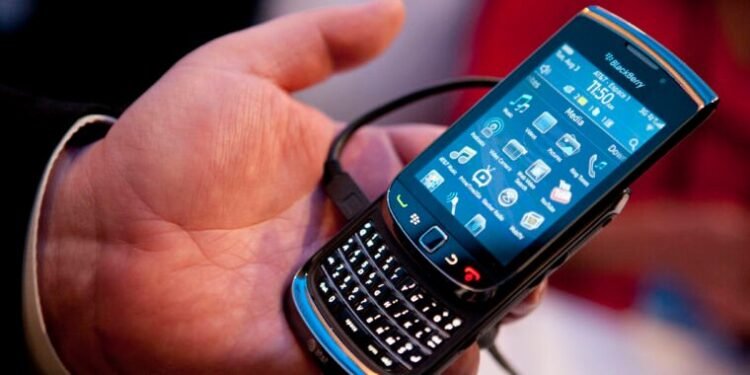BlackBerry, which once was a major player in the smartphone market, failed to keep up with the smartphone production and innovation race.
BlackBerry was created in 1999 on January 19th, and it exploded on the market with supercharged email support. Not only did they have the edge over competitors, but their ease of use and support for multiple platforms made BlackBerry extremely popular.
The Moment of Glory
In the early 1990s, BlackBerry was founded by Mike Lazaridis and Douglas Fregin. They started the company to develop a device with PDA and email capabilities. In 1999, it introduced its first BlackBerry device – the BlackBerry 850, which was considered one of the world’s most advanced phones at that time.
However, even if you didn’t own a Blackberry yourself, you probably knew someone who did or that you saw one on someone else’s screen as part of daily life. A physical QWERTY keyboard sounds easy to use, even on air or train cars.
However, its popularity was never about emailing but instead had to do with the popular Instant Messenger service, BBM.
WhatsApp is now the hottest app in town, and BBM might have been a while ago, but one thing that made it stand out was its unique read receipts feature. Despite being built for business users (a key audience when it came out) is lost to time as BlackBerry has closed shop in recent years.
In 2002, BlackBerry manufactured two other devices called 857 and 855, with some services like internet faxing available only to desktop users. These devices made it possible for users to continue using their favorite services on handhelds.
BlackBerry was the first to introduce push email as an option on their phones. By 2013, the company had 85 million users worldwide, making them one of the first companies to enter a new, emerging market.
Smartphones were still in their formative years, and they had 50% access to US mobile users by that time.
What is the Reason for BlackBerry’s Failure?
BlackBerry’s failure can be attributed to several factors. Their most significant one is that they failed to innovate quickly with their new product line.
On the other hand, Apple’s success can be attributed to its ability to adopt new technologies fast and adapt them accordingly. They were able to keep up with the pace of technological changes without compromising the quality of their products.
Adaptation and Innovation
The new BlackBerry was almost indistinguishable from the previous models. This led to a less enthusiastic response from the customer base who were only worried about their privacy.
In addition, enhancing interest in the product would also be difficult as there does not seem to be much point.
The lack of innovation with touch screens is one of the reasons that they weren’t as successful as some users were hoping for. This led to many dissatisfied early adopter customers, which hurt the storm’s overall success in the market.
Some consumers may have been hesitant to adopt touchscreen-based devices due to the Storm’s failure. However, once Apple and Samsung unveiled their phones with more mainstream features and designs, consumers were willing to buy this new technology.
Operating System
Another critical factor in BlackBerry’s failure was its commitment to its operating system—despite its flaws. From 2011 to 2015, BB’s kernel of the OS experienced a significant drop in market share attributed to its requirements at the time. The users’ issues with BB included its insistence on their OS and lack of availability.
BlackBerry’s pre-OS was limited compared to smartphones with other operating systems. The good news is that the selection of apps is more comprehensive today, making the experience more exciting and rewarding. Though BlackBerry eventually opened its app store to more popular apps, the damage was already done.
Facing Competition and Losing Market
Another reason BlackBerry’s fall from grace was so steep is because it didn’t pay as much attention to the likes of BlackBerry-created phones for businesses. It saw the iPhone as an indirect competitor & wasn’t prepared for its success as a whole.
Although BlackBerry wanted to expand its device features to match those of the iPhone and Android, users quickly realized that the device was too heavy and it had lackluster battery life.
The Blackberry story is how a company that is highly recognized in the tech industry failed to keep up with changing trends in the industry.
BlackBerry’s downfall was its inability to adapt to change quickly enough. The company has been caught off guard by some of the most revolutionary technologies, such as Apple’s iPhone and Android smartphones, and social media platforms like Facebook and Twitter.










